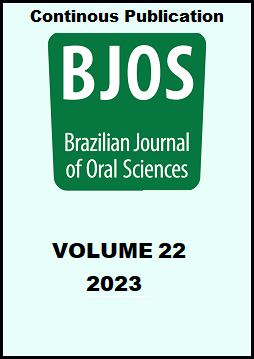Abstract
Aim: The purpose of the study was to analyze the knowledge of dentists in Belo Horizonte, Brazil, about bisphosphonates and their clinical implications. Methods: A cross-sectional questionnaire-based study was conducted with a convenience sample of dentists in Belo Horizonte, in a period of 8 weeks. The questionnaire was self-applied and was structured with 10 items about the dentists’ demographic characteristics, professional profile, and knowledge about bisphosphonates. Associations in the data were analyzed by with the Fischer’s exact test with a significance level of 5%. Results: Of the 214 participating dentists, 163 (76.17%) were women, and 51 (23.83%) were men, with age ranged for 21 to 73 years (mean of 30 years) and mean of 6 years of professional activity. Nearly half (106/49.53%) reported having knowledge about bisphosphonates, and undergraduate courses were the primary source of such information (73/34.11%). Osteoporosis was the most identified indication for use (75/35.04%), although no participants correctly identified all indications. Regarding the drugs’ side effects, only three dentists (1.40%) could correctly identify all responses, with bone necrosis being recognized by the majority (88/41.12%). Sodium alendronate (54/25.23%) and sodium ibandronate (15/7.01%) were the most identified examples of bisphosphonates. Last, only nine dentists (4.20%) could identify all examples of the drugs, and their capacity was associated with self-reported knowledge (p<0.05). Conclusions: More information about bisphosphonates should be disseminated in Belo Horizonte, ideally via better approaches in local undergraduate and postgraduate courses. Until then, knowledge of the basic aspects of bisphosphonates will remain limited.
References
Fliefel R, Tröltzsch M, Kühnisch J, Ehrenfeld M, Otto S. Treatment strategies and outcomes of bisphosphonate-related osteonecrosis of the jaw (BRONJ) with characterization of patients: a systematic review. Int J Oral Maxillofac Surg. 2015 May;44(5):568-85. doi: 10.1016/j.ijom.2015.01.026.
Billington EO, Reid IR. Benefits of bisphosphonate therapy: beyond the skeleton. Curr Osteoporos Rep. 2020 Oct;18(5):587-96. doi: 10.1007/s11914-020-00612-4.
Barbosa JS, Almeida Paz FA, Braga SS. Bisphosphonates, old friends of bones and new trends in clinics. J Med Chem. 2021 Feb;64(3):1260-82. doi: 10.1021/acs.jmedchem.0c01292.
Vannala V, Palaian S, Shankar PR. Therapeutic dimensions of bisphosphonates: a clinical update. Int J Prev Med. 2020 Oct;11:166. doi: 10.4103/ijpvm.IJPVM_33_19.
Adler RA. Update on rare adverse events from osteoporosis therapy and bisphosphonate drug holidays. Endocrinol Metab Clin North Am. 2021 Jun;50(2):193-203. doi: 10.1016/j.ecl.2021.03.003.
Kawahara M, Kuroshima S, Sawase T. Clinical considerations for medication-related osteonecrosis of the jaw: a comprehensive literature review. Int J Implant Dent. 2021 May;7(1):47. doi: 10.1186/s40729-021-00323-0.
Martins LHI, Ferreira DC, Silva MT, Motta RHL, Franquez RT, Bergamaschi CC. Frequency of osteonecrosis in bisphosphonate users submitted to dental procedures: a systematic review. Oral Dis. 2023 Jan;29(1):75-99. doi: 10.1111/odi.14003.
Forte ACCB, Frascino AVM. [Interaction of Bisphosphonates at dental surgery]. Atas Cienc Saude. 2016;4(1):12-22.
de Lima PB, Brasil VL, de Castro JF, de Moraes Ramos-Perez FM, Alves FA, dos Anjos Pontual ML, et al. Knowledge and attitudes of Brazilian dental students and dentists regarding bisphosphonate-related osteonecrosis of the jaw. Support Care Cancer. 2015 Dec;23(12):3421-6. doi: 10.1007/s00520-015-2689-6.
Vinitzky-Brener I, Ibáñez-Mancera N, Aguilar-Rojas A, Álcarez-Jardón A. Knowledge of bisphosphonate-related osteonecrosis of the jaws among Mexican dentists. Med Oral Patol Oral Cir Bucal. 2017 Jan;22 (1):e84-7. doi: 10.4317/medoral.21433.
Al-Maweri SA, Alshammari MN, Alharbi AR, Bahein AA, Alhajj MN, Al-Shamiri HM, et al. Knowledge and opinions of saudi dentists regarding dental treatment of patients undergoing bisphosphonates. Eur J Dent. 2020 Feb;14(1):144-151. doi: 10.1055/s-0040-1701542.
Al-Eid R, Alduwayan T, Bin Khuthaylah M, Al Shemali M. Dentists' knowledge about medication-related osteonecrosis of the jaw and its management. Heliyon. 2020 Jul;6(7):e04321. doi: 10.1016/j.heliyon.2020.e04321.
Alqhtani NR, Almalki AK, Zuhair FA, Alenazi AA, Nabhan AB, Alqahtani M. Knowledge, Attitude, and Management of General Dentist toward Medication-related Osteonecrosis of the Jaws. J Pharm Bioallied Sci. 2020 Aug;12(Suppl 1):S151-S154. doi: 10.4103/jpbs.JPBS_47_20.
El-Ma'aita A, Da'as N, Al-Hattab M, Hassona Y, Al-Rabab'ah M, Al-Kayed MA. Awareness of the risk of developing medication-related osteonecrosis of the jaw among bisphosphonate users. J Int Med Res. 2020 Sep;48(9):300060520955066. doi: 10.1177/0300060520955066.
Rotman-Pikielny P, Leonenko M, Barzilai L, Nabriski D, Twito O, Kagan R. Patients' knowledge and opinions regarding osteoporosis, osteoporosis treatment, and oral health care. J Am Dent Assoc. 2019 Oct;150(10):830-8. doi: 10.1016/j.adaj.2019.05.019.
Alhussain A, Peel S, Dempster L, Clokie C, Azarpazhooh A. Knowledge, practices, and opinions of ontario dentists when treating patients receiving bisphosphonates. J Oral Maxillofac Surg. 2015 Jun;73(6):1095-105. doi: 10.1016/j.joms.2014.12.040.
Escobedo MF, García-Consuegra L, Gay S, Álvarez L, Olay S, Ascani G, et al. Influence of the teaching program on the learning in knowledge and practice of osteonecrosis of the jaws produced by antireasorptives in dental students of the Principality of Asturias (Spain). J Clin Exp Dent. 2017 Dec;9(12):e1402-7. doi: 10.4317/jced.54129.
Federal University of Minas Gerais – UFMG. [Official curricular version of the FO-UFMG dentistry course]. Belo Horizonte; 2013 [cited 2021 Mar 15]. Available from: https://www.odonto.ufmg.br/colgrad/wp-content/uploads/sites/3/2021/08/VersaoCurricular2013-2-Autenticada.pdf. Portuguese.
Miranda-Silva W, Montezuma MA, Benites BM, Bruno JS, Fonseca FP, Fregnani ER. Current knowledge regarding medication-related osteonecrosis of the jaw among different health professionals. Support Care Cancer. 2020 Nov;28(11):5397-404. doi: 10.1007/s00520-020-05374-4.
Patil V, Acharya S, Vineetha R, Nikhil K. Awareness about medication-related osteonecrosis of the jaw among dental professionals: a multicentre study. Oral Health Prev Dent. 2020;18(1):505-9. doi: 10.3290/j.ohpd.a43361.
Han AL. The awareness and practice of dentists regarding medication-related osteonecrosis of the jaw and its prevention: a cross-sectional survey. BMC Oral Health. 2021 Mar;21(1):155. doi: 10.1186/s12903-021-01475-6.
Hayes KN, Winter EM, Cadarette SM, Burden AM. Duration of bisphosphonate drug holidays in osteoporosis patients: a narrative review of the evidence and considerations for decision-making. J Clin Med. 2021 Mar;10(5):1140. doi: 10.3390/jcm10051140.

This work is licensed under a Creative Commons Attribution 4.0 International License.
Copyright (c) 2022 Raquel Laís Ottoni Nunes, Nicole Ribeiro dos Anjos, Luciano Henrique Ferreira Lima, Ana Paula Cota Viana, Larissa de Ávila Pereira, Fábio Fernandes Borém Bruzinga, Soraya de Mattos Camargo Grossmann


